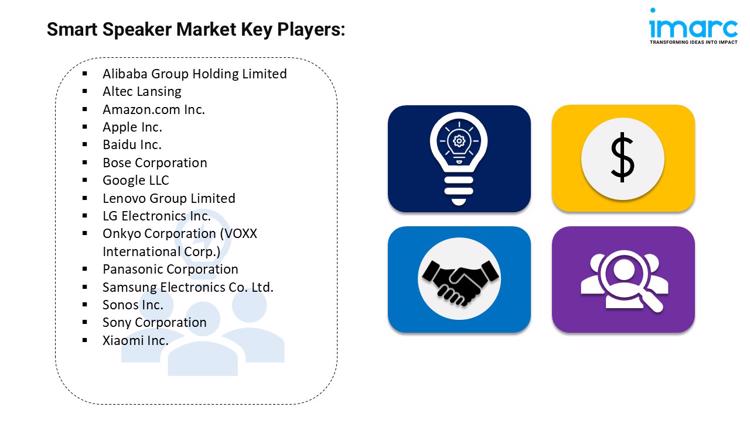
Market Overview:
The smart speaker market is experiencing rapid growth, driven by ecosystem integration & home automation, voice commerce & personalized services, and enhanced privacy & security features. According to IMARC Group's latest research publication, "Smart Speaker Market Size, Share, Trends and Forecast by Component, Intelligent Virtual Assistant, Connectivity, Price Range, Distribution Channel, End User, and Region, 2025-2033", The global smart speaker market size was valued at USD 10.11 Billion in 2024. Looking forward, IMARC Group estimates the market to reach USD 59.12 Billion by 2033, exhibiting a CAGR of 21.48% from 2025-2033.
This detailed analysis primarily encompasses industry size, business trends, market share, key growth factors, and regional forecasts. The report offers a comprehensive overview and integrates research findings, market assessments, and data from different sources. It also includes pivotal market dynamics like drivers and challenges, while also highlighting growth opportunities, financial insights, technological improvements, emerging trends, and innovations. Besides this, the report provides regional market evaluation, along with a competitive landscape analysis.
Grab a sample PDF of this report: https://www.imarcgroup.com/smart-speaker-market/requestsample
Our report includes:
Factors Affecting the Growth of the Smart Speaker Industry:
The Smart Speaker market is experiencing a significant surge driven by the seamless integration of these devices into broader smart home ecosystems and the growing demand for home automation. This dynamic is fueled by the increasing interoperability of smart speakers with a wide range of connected devices, including lighting systems, thermostats, security cameras, and kitchen appliances. Consumers are seeking unified control over their home environments, and smart speakers serve as central hubs for voice-activated automation. Furthermore, the development of robust APIs and software development kits (SDKs) is enabling third-party developers to create innovative skills and integrations, expanding the functionality of smart speakers. The adoption of mesh networking technologies is enhancing the range and reliability of smart home networks, ensuring seamless communication between devices. The focus on user-friendly interfaces and intuitive voice commands is simplifying the process of managing smart home devices. The integration of contextual awareness and predictive automation is enabling smart speakers to anticipate user needs and automate tasks based on routines and preferences. The increasing demand for energy efficiency and sustainability is driving the development of smart home solutions that optimize energy consumption. This ecosystem integration is not merely about controlling devices; it's about creating a personalized and automated living environment that enhances convenience and comfort.
The Smart Speaker market is witnessing a strong trend towards voice commerce and the delivery of personalized services, driven by the desire for frictionless shopping experiences and tailored information. This dynamic is fueled by the increasing adoption of voice-activated purchasing and the integration of smart speakers with e-commerce platforms and payment gateways. Consumers are finding it convenient to order products, book services, and manage their finances using voice commands. Furthermore, the development of AI-powered recommendation engines is enabling smart speakers to provide personalized product suggestions and information based on user preferences and past interactions. The integration of personalized news briefings, weather updates, and calendar reminders is enhancing the utility of smart speakers as personal assistants. The focus on natural language processing (NLP) and contextual understanding is improving the accuracy and relevance of voice interactions. The increasing demand for personalized entertainment experiences is driving the development of smart speaker features that curate music playlists, podcasts, and audiobooks based on user preferences. The integration of location-based services and contextual awareness is enabling smart speakers to provide personalized information and recommendations based on the user's location and surroundings. This voice commerce and personalization is not merely about convenience; it's about creating a proactive and intuitive service experience that anticipates user needs and provides tailored solutions.
The Smart Speaker market is experiencing a growing emphasis on enhanced privacy and security features, driven by increasing consumer concerns about data collection and unauthorized access. This dynamic is fueled by the heightened awareness of potential privacy risks associated with voice-activated devices and the need for robust security measures. Smart speaker manufacturers are implementing advanced encryption techniques, secure authentication protocols, and transparent data management practices. Furthermore, the development of on-device processing and edge computing is reducing the reliance on cloud-based data storage and processing, enhancing data privacy. The integration of microphone mute buttons and visual indicators is providing users with greater control over their privacy. The focus on data minimization and anonymization is ensuring that user data is collected and used responsibly. The increasing demand for transparent privacy policies and user-friendly privacy controls is leading to the development of intuitive interfaces that provide clear information about data usage. The integration of biometric authentication and voice recognition is enhancing the security of voice-activated transactions. This enhanced privacy and security is not merely about compliance; it's about building trust and ensuring that smart speakers are used responsibly and ethically.
Leading Companies Operating in the Global Smart Speaker Industry:
